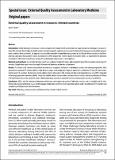| dc.contributor.author | Carter, Jane Y. | |
| dc.date.accessioned | 2022-08-19T11:14:33Z | |
| dc.date.available | 2022-08-19T11:14:33Z | |
| dc.date.issued | 2017 | |
| dc.identifier.citation | Carter, J.Y. (2017). External quality assessment in resource–limited countries. Biochemia Medica, 27, 97 - 109. | en_US |
| dc.identifier.other | DOI:10.11613/BM.2017.013 | |
| dc.identifier.other | Corpus ID: 9099015 | |
| dc.identifier.uri | https://repository.amref.ac.ke/handle/123456789/775 | |
| dc.description | ©Copyright by Croatian Society of Medical Biochemistry and Laboratory Medicine. This is an Open Access article distributed under the terms of the Creative Commons Attribution Non-Commercial License
(http://creativecommons.org/licenses/by-nc-nd/4.0/) which permits unrestricted non-commercial use, distribution, and reproduction in any medium, provided the original work is properly cited. | en_US |
| dc.description.abstract | Abstract
Introduction: Health laboratory services are a critical component of national health systems but face major operational challenges in resource-limited (RL) settings. New funding for health systems strengthening in RL countries has increased the demand for diagnostics and provided opportunities to address these constraints. An approach to sustainably strengthen national laboratory systems in sub-Saharan African countries is the Strengthening Laboratory Management Toward Accreditation (SLMTA) programme. External Quality Assessment (EQA) is a requirement for laboratory
accreditation. EQA comprises proficiency testing (PT), rechecking of samples and on-site evaluation.
Materials and methods: A systematic literature search was conducted to identify studies addressing laboratory EQA and quality monitoring in RL
countries. Unpublished reports were also sought from national laboratory authorities and personnel.
Results: PT schemes in RL countries are provided by commercial companies, institutions in developed countries and national programmes. Most
government-supported PT schemes address single diseases using a vertical approach. Regional approaches to delivering PT have also been implemented across RL countries. Rechecking schemes address mainly tuberculosis (TB), malaria and human immunodeficiency virus (HIV); integrated
rechecking programmes have been piloted. Constraints include sample transportation, communication of results, unknown proficiency of referee
staff and limited resources for corrective action. Global competency assessment standards for malaria microscopists have been established.
Conclusions: EQA is vital for monitoring laboratory performance and maintaining quality of laboratory services, and is a valuable tool for identifying and assessing technology in use, identifying gaps in laboratory performance and targeting training needs. Accreditation of PT providers and
competency of EQA personnel must be ensured. | en_US |
| dc.language.iso | en | en_US |
| dc.publisher | Biochemia Medica | en_US |
| dc.subject | Laboratory | en_US |
| dc.subject | Quality assurance | en_US |
| dc.subject | Proficiency testing | en_US |
| dc.subject | Resource-limited countries | en_US |
| dc.title | External Quality Assessment in Resource-limited Countries | en_US |
| dc.type | Article, Journal | en_US |

